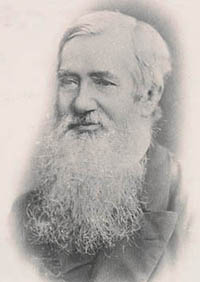|
the Chronicle. In the
tension which developed between them and the English Benedictine bishop,
John Bede Polding, his sympathies were strong with Polding. Polding being
abroad, Duncan's critics, egged on, he alleged, by his political enemy,
William Charles Wentworth, forced him from the editor's chair late in 1842,
provoking his An Appeal from the Unjust Decision of the Very Rev. Vicar
General (Sydney, 1843). In 1843 Duncan also published three polemical
Letters, which answered Robert Allwood's criticism of Polding's assumption
of a territorial title. Yet Polding did not reinstate Duncan to the
Chronicle and the two thereafter were alienated.
Duncan established his own
Duncan's Weekly Register, of Politics, Facts and General Literature in July
1843. Its literary columns revealed him as an intelligent critic and the
patron, publisher and friend of colonial poets, especially Charles Harpur
and (Sir) Henry Parkes. As editor Duncan stressed the liberal quality of his
Catholicism. He deplored the tendency, strongest among the Irish but
apparent even in Polding, to emphasize the alienation of Catholics from the
community at large. Especially he disputed the church's antagonism to
non-denominational education. Other leading articles, some reprinted as
pamphlets (On Self-Supporting Agricultural Working Unions and A Practical
Treatise on the … Olive-Tree, Sydney, 1844), praised close-knit rural life
in a manner characteristic of much Catholic social thought. His campaign
against the dominance of any narrow class interest continued, although
squatters now replaced landowners as his major enemy. He stood firm, but
not, as sometimes said, alone, beside Governor Sir George Gipps in the land
controversy of 1844. The squatters' hostility might have contributed to
financial troubles which forced the Register to close in December 1845.
Gipps offered a post as customs officer at Moreton Bay and, to the cry of
jobbery, Duncan accepted in May 1846.
Thereafter Duncan earned his living in the customs service. At Brisbane he
filled many subsidiary posts including deputy-sheriff, immigration officer,
chairman of the Steam Navigation Board, commissioner of the peace, and water
police magistrate. His diligence and ability were as marked as ever, and won
him appointment as the New South Wales collector of customs in May 1859. The
most eventful episode in this position occurred in 1868, when Duncan left
office during a complex dispute in which the Customs Department became a
topic of political controversy. However, he soon returned to his post,
continuing in it until 1881. On retirement he was appointed a C.M.G.
Duncan's success in an uncongenial job best proved his human quality.
Moreover he always continued wider interests: anthropology, botany,
literature, music, politics, philanthropy, education. His Lecture on
National Education (1850) was the first pamphlet printed in Brisbane, and he
was founding president of the School of Arts there (1850-54). In 1856 he
published A Plea for the New South Wales Constitution, which criticized
radical extremists who were already arguing for the replacement of the
nominated Legislative Council by an elective body. Although denying any
change of principle, Duncan now sympathized with Wentworth's plan for a
local nobility. As a liberal churchman he engaged in controversies with both
Polding (1858-59) and Roger Vaughan (1880), and sat on the National Board of
Education and later the Council of Education. His Account of a Memorial … by
Captain Pedro Fernandez de Quir (Sydney, 1874) was the fruit of a
long-standing interest in historical research, while his Memoir of … Joseph
Monnier, S.M. (Sydney, 1876) translated a biographical sketch of a priest
who had worked in Oceania and New South Wales. Institutions to benefit from
his support and leadership included the Free Public Library of Sydney, St
John's College, St Vincent's Hospital, and St Cecilia's Philharmonic
Society.
Duncan died at his home, The Boulevard, Petersham, on 25 June 1885 and was
buried in the Devonshire Street cemetery. At Aberdeen in 1831 he had married
Mary Yates (Yeats); she died on 21 December 1880. They had a son, Lewis
(1834-1845) and six daughters, one of whom, Mary, became a member of the
convent of the Sisters of Charity. |

